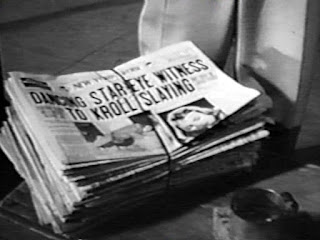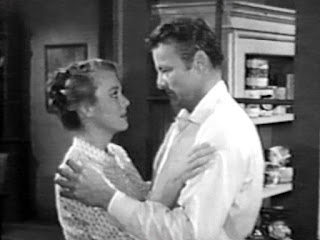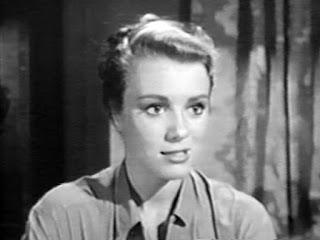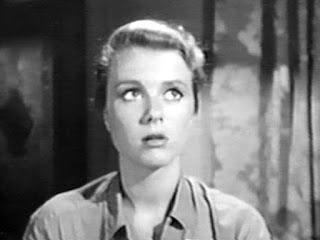CBS aired the dramatic series Crusader starring Brian Keith in 1955 and 1956. In the first season, Matt Anders travels all around the world to combat Communism and oppression and as each episode's title card suggests:
Crusader records the struggle of democratic people against the enemies of freedom and justice at home and abroad. These are the stories of the people who have been helped by the many great organisations which are dedicated to bringing truth to those who are fed lies, light to those who live in darkness, protection to those who live in fear.
In its second season, Matt involves himself more in criminal stories that take place in America. There are still international intrigue episodes, but Inger's episode is an example of how the show turned to more domestic issues, such as murder and organized crime.
Martin Kroll is murdered as he enters a residence. Two men, assumed to be in the mob, quickly flee the scene. After the murder is featured in the newspaper, the sole eyewitness comes forward. She is a young dancer named Alicia Devar (Inger) and her picture and personal details are splashed on the front page of the newspaper. For Alicia's protection, Matt and the local police post themselves in the boarding house where Alicia lives with a grouchy old landlord and a middle-aged diner cook. Matt is perplexed that Alicia has come forward as the witness and subjected herself to the media, but has yet to agree to be a witness in the trial.
The police have asked the landlord and other tenant to leave, but they refuse. The landlord refuses because he "wanna see what happens. It's part of being old. You don't get scared anymore." The old man is not fond of Alicia at all because she's three weeks late on her rent and he feels:
She coulda got a job waitressing but, oh, no, she's gotta be this high and mighty dancer!
Fred, the other tenant in the house, feels differently. He brings Alicia nightly dinners from the diner and coddles her. It is clear he's smitten.
Alicia seems amused by the attention but not as frightened as you would expect a woman in danger to be. She stays up late sharing her life story with Matt over a cup of coffee. She tells him she's from Iowa and that she's been struggling in the city but does not want to return home a failure. When Matt talks to another officer in the house about it, the officer says the story is slightly different than the one she was told. She chalks it up to a crush Alicia may have for Matt and remarks:
She's a kid...It's all part of the game.
Matt replies that it is impossible not to like Alicia because "she's like a lost kitten." He interviews Fred about his housemate and Fred mentions that he finds it strange Alicia didn't mention that she witnessed the murder while they were watching television on the night in question. In fact, Alicia never mentioned anything about the murder at all until she went to the police. Instantly suspicious, Matt questions Alicia about what she saw. Alicia recalls that she was walking when she saw the car go by and she remembers the elm trees. But when Matt asks Alicia the color of the car, she cannot answer. Elm trees were mentioned in the newspaper article. Car color was not.
It's obvious that Alicia lied about witnessing the murder. She took information from the article and used it in order to gain publicity. The trick works. Publicity agents call Alicia after seeing her photo in the paper wanting to represent and audition her. She is elated.
Matt accuses Alicia:
You were gonna go before the grand jury in court to swear a lie for what you could get out of it!
Desperate to be a famous dancer, Alicia says:
Why shouldn't I? I'm tired of being a nobody! And, anyway, what difference would it make? Everybody knows they did it.
Outraged, Matt counters:
And you picked yourself to sit in judgement, eh? I hope the judge and jury you get are less prejudiced.
Alicia's publicity stunt has dire consequences. Innocent people are murdered as the killers hunt for her. And yet, Alicia has no feeling whatsoever over the madness she causes. She only thinks of herself. When confronted with all the damage she has caused, Alicia's only response to Matt is:
You don't care for me at all, do you?
Inger typically played what she wrote to her brother were "good girl" roles so it is a departure to see her ultimately play an unsympathetic character here. Inger manages to balance the part so that you see Alicia is acting out of ignorance, adolescence and the desperation to succeed. Most of Inger's characters seemed wiser than their age (to me) yet Alicia is too immature to see the predicament she's created. In less than a half hour, Inger's character switches from a lovely, down-on-her-luck dancer to a selfish, manipulative young woman. Alicia is a character so completely wrapped up in her own needs and wants that she is unable to understand or feel guilty for the damage her actions have.











No comments:
Post a Comment